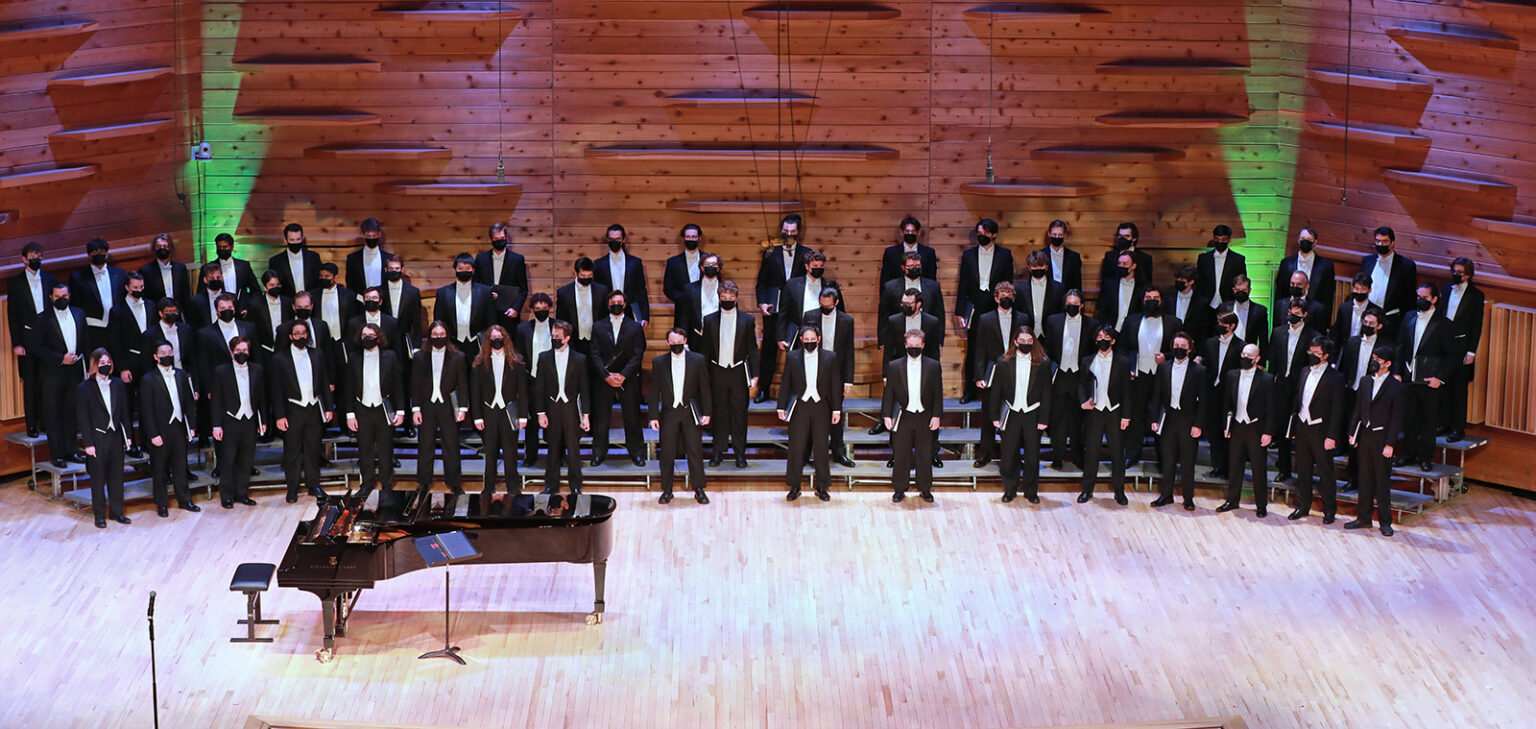- 848.932.7474
- info@rutgersalumni.org
Celebrating the Sound of School Spirit
By David F. Chapman SGS’08
The 2021-22 academic year marks the 150th anniversary of the Rutgers University Glee Club, one of the school’s most iconic institutions, and one of the oldest and most distinguished choruses in the United States. The Rutgers Glee Club, initiated by the 1872 Rutgers College sophomore class, is currently the oldest continuously active student-run organization at the University.
Initially consisting of only 11 students, the Club’s performance activities were at first limited to football games, where spirited songs were used to cheer on the football team and entertain the crowd. However, the group rapidly evolved from performing mainly school-oriented songs to include more formal concerts, beginning in 1873. These included “on the road” performances in places such as Flatbush, Long Island.
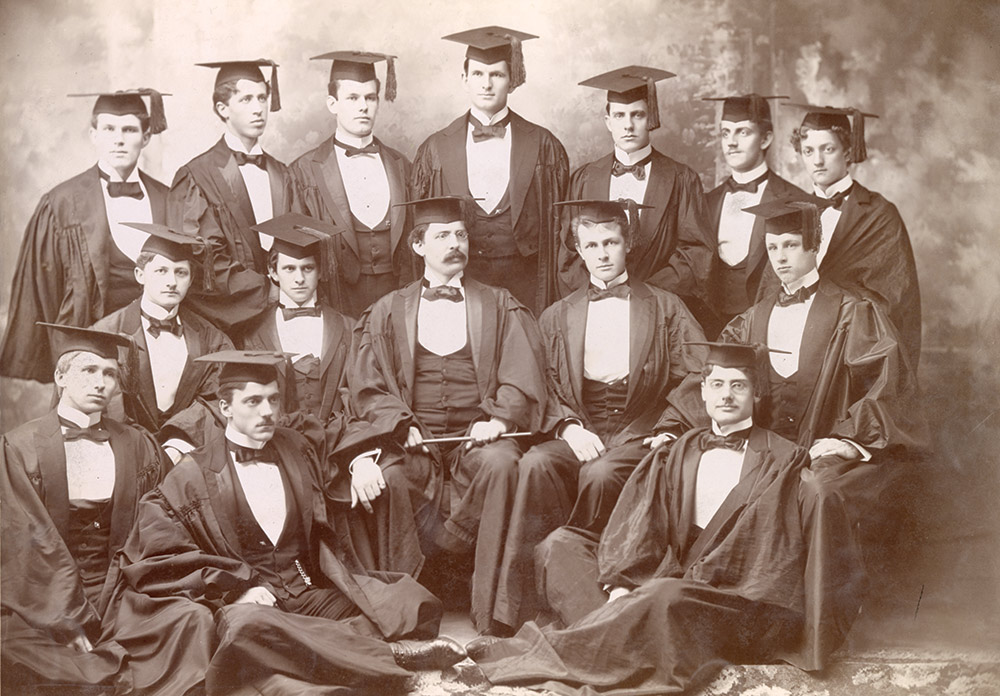
As the Glee Club began to establish itself as a prominent fixture within the Rutgers College community, it was determined that the group would be best served by employing a professional musician to act as its leader/director. The first man to occupy this role was the colorful and flamboyant composer and minstrel performer Loren Bragdon (1856-1914). Under his leadership, the Club was able to share the stage with renowned musical performers of all types, many recruited from the opera houses and concert halls of New York and Philadelphia. Bragdon added his own distinctive performance stylings to this mixture, forging the Glee Club into a must-have attraction at many prestigious school functions, including a featured yearly billet on the College’s commencement program. Bragdon also introduced an extensive schedule of touring for the Club, with concert excursions to locations as wide-ranging as St. Augustine, Florida and the coast of Maine. Most years of his tenure offered what was referred to as the Hudson River Tour, which saw the Club perform at venues along that waterway, including Fishkill, Yonkers, Hudson, and Kingston. These tours were an excellent platform where Rutgers College could project an image of artistic accomplishment and institutional sophistication. As a tool for recruiting, as well as creating increased awareness for Rutgers College, these outings proved invaluable.
Bragdon remained in his post as leader of the Glee Club until the end of 1894. Taking his place was the church musician and music educator George W. Wilmot. A prominent citizen of New Brunswick, Wilmot was employed as the choir director at Christ Church in that city for 45 years beginning in 1885. Wilmot was a Rutgers College Glee Club alumni, singing first tenor in the ensemble for a number of years during Bragdon’s reign. The Club continued to flourish under Wilmot for the next 12 years, engaging in many of the activities that Bragdon had initiated, including an extensive travel schedule.
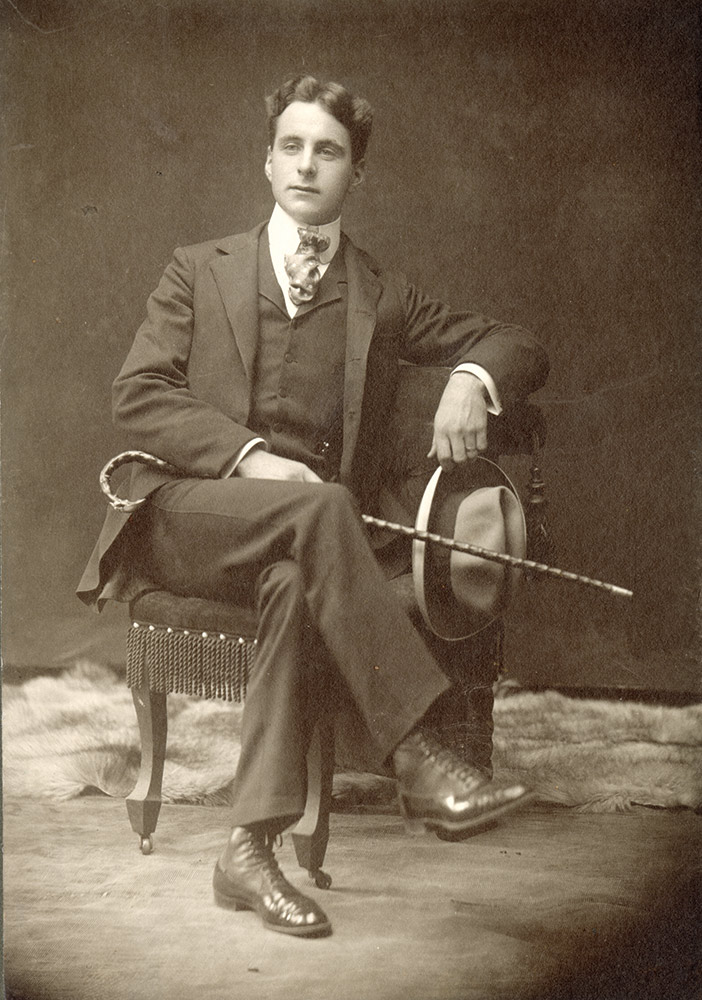
Following Wilmot’s resignation in 1906, the Club underwent a period of profound structural change. Within two years, the Glee Club had merged with the Rutgers College Mandolin Club to form an amalgamated ensemble under one group of student officers. The Musical Clubs, as the combined groups were called, offered performances in this consolidated format for many years to come.
It was, then, in this configuration, that the Glee Club entered its modern era. The man most responsible for the development of all musical activities in the twentieth century at Rutgers, including those of the Glee Club, was Howard Decker McKinney, RC’13. While an undergraduate, McKinney had served as the accompanist for the group and, in his senior year, as the Club’s president. He was hired by Rutgers in the fall of 1916, purportedly as a musical coach for the combined Clubs. By the end of that year, McKinney had been appointed to the newly created post of musical director of Rutgers College.
In that position, McKinney began to totally reimagine the role of music at Rutgers College. One of his most innovative initiatives was the creation of a series of concerts to be presented over the course of an academic season. By 1918, these events were codified by both the College and the townspeople of the surrounding New Brunswick area as the Annual Winter Concert Course; later these events would become more colloquially known as the Concert Series. In the ensuing years, McKinney’s Concert Series would stand as a showcase for the greatest talent on the contemporary art-music scene.
By the academic year 1931-32, McKinney was engaged not only with the Concert Series, the Glee Club, and other musical activities at Rutgers, but with similar duties at the newly formed female coordinate, the New Jersey College for Women, as well. It was during this season that McKinney decided to, in effect, turn the reins of the Glee Club over to a promising young Student Leader, F. Austin “Soup” Walter ‘32. Walter’s first appearance as conductor, of the Glee Club or any other ensemble, occurred at Carnegie Hall in Manhattan on February 27, 1932. Walter was McKinney’s protégé, with Walter conducting a majority of performances over the next several years, and eventually assuming the role of director.
In October 1940, Walter directed the Club in a performance of the Earl Hawley Robinson patriotic cantata The Ballad for Americans, featuring Rutgers alumnus and famed African American bass-baritone Paul Robeson, RC’19. As a student, Robeson had often performed with the Glee Club, albeit “unofficially” due to the social climate at the time. After moving on to considerable success in his professional life as a vocalist and film star, Robeson frequently returned to his alma mater. He appeared in McKinney’s Concert Series in 1927, 1929, and 1932 in addition to this 1940 appearance; he would return to campus subsequently for similar events.
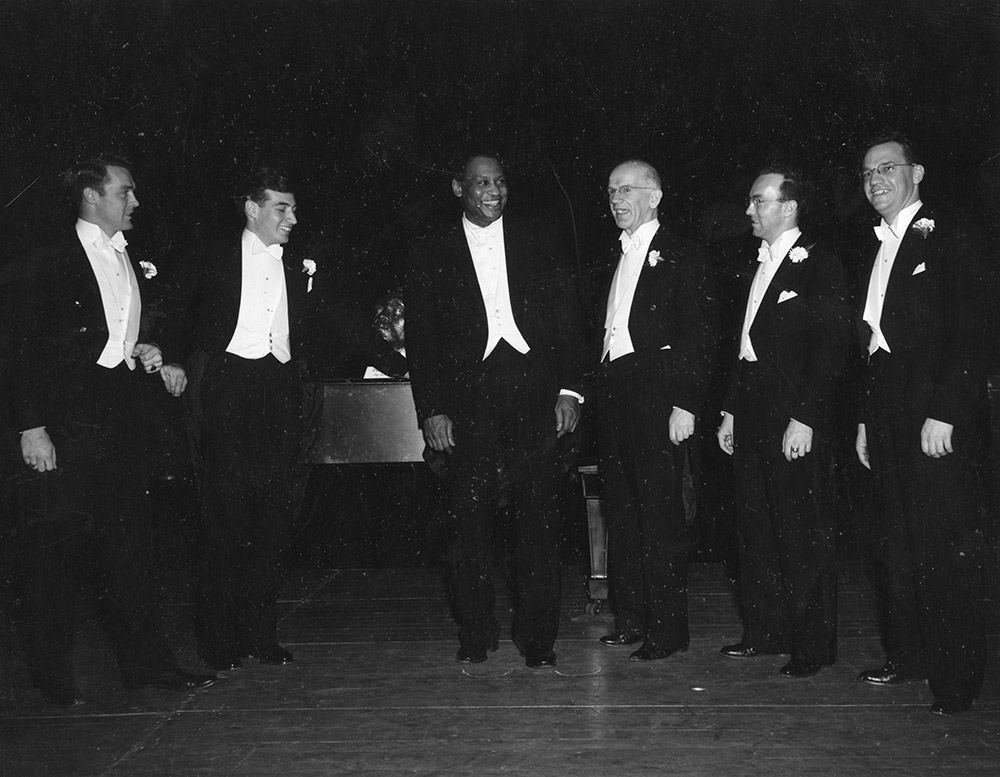
Walter continued the Concert Series tradition, often utilizing the all-male Glee Club joined with female vocalists from the women’s college to form the Rutgers University Choir. This consolidated entity was generally acknowledged as a premiere performing ensemble, attracting to the Rutgers campus some of the biggest names in symphonic and choral music of this period for landmark concerts. Over the ensuing decades, Walter and the Glee Club/University Choir would host the likes of Leonard Bernstein and the New York Philharmonic; Serge Koussevitzky and the Boston Symphony Orchestra; Eugene Ormandy and the Philadelphia Orchestra; Erich Leinsdorf and the Rochester Philharmonic; and a variety of solo artists, including, in addition to Robeson, Metropolitan Opera performers Leontyne Price and Mack Harrell.
Walter was also responsible for instituting a series of European excursions, expanding on the original touring formula from the Bragdon/Wilmot days. The intent was the same: to promote the University by displaying the best that the institution had to offer. By the time of Walter’s retirement from his role as director of the Glee Club in 1983, the group had participated in no less than ten such overseas trips, presenting concerts at prestigious performing venues in The Netherlands and Germany (1966), Czechoslovakia (1970), and Romania (1975), the latter two areas both at the time under Communist rule.
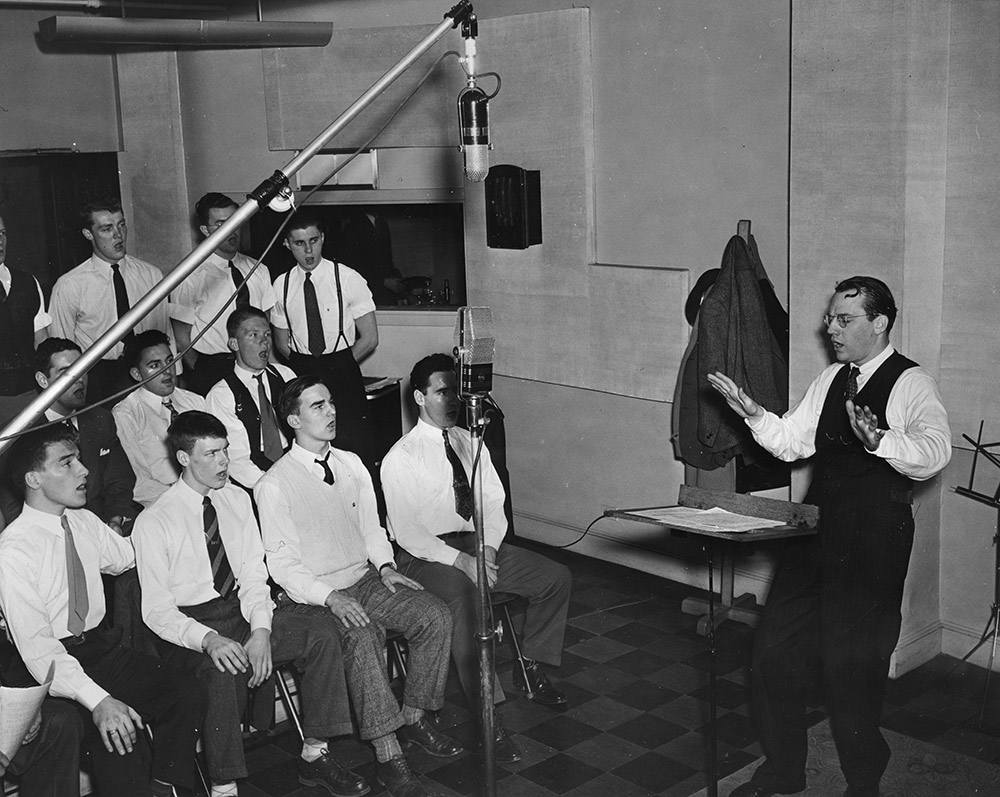
After Walter’s retirement in 1983, his position as director of the Glee Club was passed on to a series of able successors. However, the tenures of these new arrivals tended to be brief, often due to professional considerations of their own that would ultimately take precedence over their duties at Rutgers. In 1993, after careful deliberations and a national search, Patrick Gardner was appointed to the newly created position of director of choral activities in the music department of the newly formed Mason Gross School of the Arts. He continues in that position today, currently holding the rank of distinguished professor of music.
Gardner continued the practice of overseas touring that Walter had initiated for the Club, instituting a once-in-a college-career schedule that ensured dedicated members would have a chance to participate.
During his tenure, there have been seven such excursions, to locales as varied as Poland and Lithuania (1996), Italy (2011), and Estonia (2018). Additionally, the Glee Club during this period has produced several recordings on CD. This represents the updating and expansion of another Walter tradition; Walter oversaw the first recording of the Glee Club in 1943 and produced a series of successor recordings on vinyl disc.
Gardner has forged a reputation for the current incarnation of the Rutgers University Glee Club as a premiere performing group. His work with the Club has influenced the world of all-male ensembles and the choral world in general since his arrival at Rutgers.
Frank Albinder, conductor of the University of Virginia Glee Club and current director of the Washington Men’s Camerata, said Gardner’s work “is in the upper echelon – the stratosphere – of collegiate men’s ensembles.” Albinder compares the Rutgers University Glee Club not only to its direct counterparts at comparable American universities, but, indeed, to the best choral groups in the world.
In the academic year marking its 150th anniversary, the Rutgers University Glee Club held a 150th Anniversary Concert on April 30. Further, the Rutgers University Press issued a commemorative book titled A History of the Rutgers University Glee Club in April 2022.
